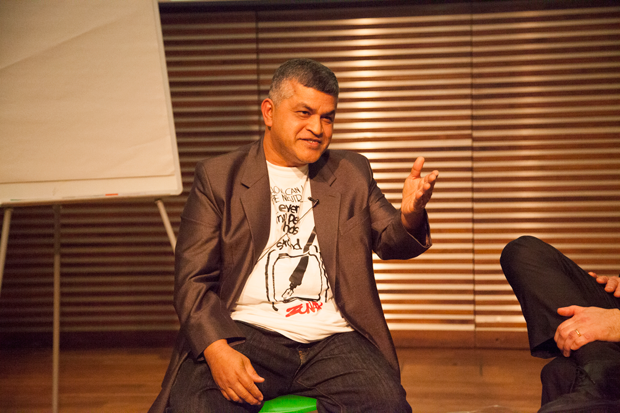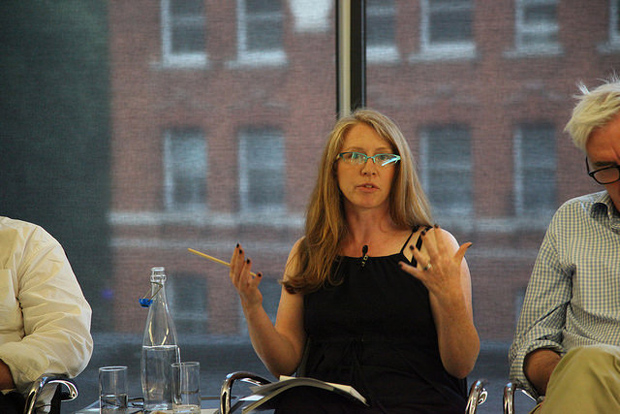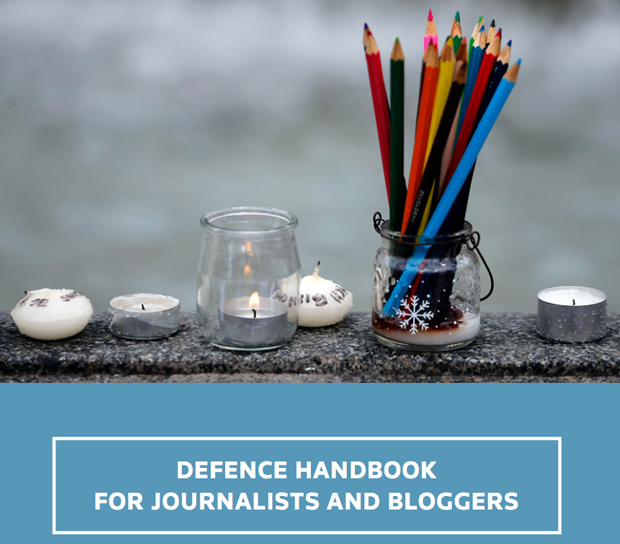7 Jul 2015 | Asia and Pacific, Campaigns, Malaysia, mobile

Malaysian cartoonist Zunar is facing charges under a colonial era sedition act. (Photo: Sean Gallagher/Index on Censorship)
Persecuted Malaysian cartoonist Zulkiflee Anwar Haque, who is facing nine simultaneous charges under the country’s controversial Sedition Act, has had his case pushed back until 9 September.
The artist, known as Zunar, told supporters in an email that his case had been adjourned pending a ruling from the Federal Court in a separate case that challenges the constitutionality of the Sedition Act.
The current case sees Zunar facing 43 years in prison over a tweet criticising the recent jailing of a Malaysian opposition leader. He has been targeted numerous times for speaking out against the Malaysian government in his editorial cartoons. Zunar was investigated under the sedition act for the first time in 2010, much of his work has been banned, and he has been subjected to repeated raids, arrest and detainment.
“Zunar is being prosecuted simply for exercising his right to express himself. We welcome the legal challenge to the Sedition Act; a tool the government uses to try and stifle and silence dissent from Zunar and other critics. But regardless of the outcome in that case, we reiterate our call on Malaysia to immediately drop all charges against Zunar and respect free expression,” said Index on Censorship CEO Jodie Ginsberg.
You can support Zunar by signing this petition to call on the Malaysian government to drop all charges against him and renew its commitment to freedom of expression.
See cartoons by Zunar and other international artists on the theme of free expression drawn to commemorate our 15th Freedom of Expression awards.
3 Jul 2015 | mobile, News
A new handbook aims to provide journalists and bloggers worldwide with guidance on the international legal framework protecting their rights to freedom of expression.
Produced by the Thomson Reuters Foundation, Reporters Without Borders, and law firm Paul Hastings, the Defence Handbook for Journalists and Bloggers focuses on how international legal principles apply to journalists’ work. It also includes previous decisions and recommendations made by international and regional bodies and courts on aspects of freedom of speech.
“Journalists around the world are more and more under threat and often become targets,” said Monique Villa, CEO of the Thomson Reuters Foundation. “Terrorist groups, but also powerful lobbies and a number of governments are increasingly trying to censor the media, preventing opinion sharing and the release of vital information to the public. Now more than ever, journalists need to be brave, avoid self-censorship, and be aware that they can seek refuge in international law. This guide is a very powerful weapon.”

Index CEO spoke at the launch of the handbook (Photo: Thomson Reuters Foundation)
Index on Censorship chief executive Jodie Ginsberg spoke at the launch of the handbook, outlining the threats that Index has identified in its work mapping media freedom in the European Union and neighbouring countries. Since Index launched the project in mid-2014 more than 800 incidents have been reported to the map. Ginsberg described a climate of fear in which governments crack down increasingly on the media and free expression more generally, and cited a lack of awareness among some media professionals about the laws that protect them. “Uncertainty — when journalists don’t know their rights — leads to self-censorship,” she said.
Other speakers at the event in London included Christophe Deloire, secretary general of Reporters Without Borders; John Lloyd, senior research fellow at the Reuters Institute; Sylvie Kaufmann, editorial director and columnist at Le Monde; lawyer William Bourdon; and journalist Owen Bennett-Jones.
This article was posted on 3 July 2015 at indexoncensorship.org
25 Jun 2015 | Azerbaijan, Azerbaijan News, Europe and Central Asia, News

Rahim Haciyev, editor of Azerbaijani newspaper Azadliq, holds up a copy at the 2014 Index awards (Photo: Alex Brenner for Index on Censorship)
Index award-winning newspaper Azadliq, widely recognised as one of the last remaining independent news outlets operating inside the country, is facing imminent closure. This comes amid an ongoing crackdown on critical journalists and human rights activists in Azerbaijan, and as the country is hosting the inaugural European Games in the capital Baku.
A statement from the paper, quoted Thursday on news site Contact, outlined its “difficult financial situation”.
“If the problems are not resolved in the shortest possible time, the publication of the newspaper will be impossible,” it read.
“The closure of an independent media outlet like Azadliq, which Azerbaijani officials have suffocated over the past two years, flies in the face of repeated assurances from President Ilham Aliyev that his government respects press freedom. The fact that this financial crisis is occurring during the Baku European Games just underlines the shameful disregard that the Azerbaijani government has for freedom of expression,” said Index on Censorship CEO Jodie Ginsberg.
Azadliq has long faced an uphill battle to stay in business. Thursday’s statement merely detailed the latest development in a serious financial crisis, brought about at the hands of Azerbaijani authorities.
In July 2014, Azadliq was forced to suspend print publication. Editor Rahim Haciyev told Index that the government-backed distributor had refused to pay out the some £52,000 it owed the paper, which meant it could not pay its printer.
The paper has also seen its finances squeezed through being banned from selling copies on tube stations and the streets of Baku, and being slapped with fines of some £52,000 following defamation suits in 2013. The paper was also evicted from its offices in 2006 and its journalists have been repeatedly targeted by authorities. Seymur Hezi, for instance, was in January sentenced to five years in prison for “aggravated hooliganism” — charges widely dismissed as trumped up and politically motivated.
Azadliq — meaning “freedom” in Azerbaijani — has appealed to the public for help to stay afloat, urging “those who defend the freedom of speech in Azerbaijan” to join in the campaign to save the paper.
This comes after the Parliamentary Assembly of the Council of Europe (PACE) condemned “the crackdown on human rights in Azerbaijan”. In a resolution adopted on Wednesday 24 June, PACE called on authorities to “put an end to systemic repression of human rights defenders, the media and those critical of the
government”.
This article was posted on 25 June, 2014 at indexoncensorship.org
24 Jun 2015 | Europe and Central Asia, News, Poland
Journalist Lukasz Masiak, founder of news site NaszaMlawa.pl, was attacked and killed in Poland on 14 June 2015. Masiak, who had been subject to numerous threats believed to be connected to his work, died of traumatic brain injury after being assaulted, according to TVN24.
Launched in 2010, NaszaMlawa.pl covers Mlawa, a town of about 30,000 in the north central part of Poland. Masiak’s site reported on several controversial issues, including the dealings of local businessmen, drug use involving participants of the local mixed martial arts league, incidents involving Roma citizens in the area and the botched investigation into the death of a young woman. He received death threats following the latter story.
The attack on 31-year-old Masiak took place in the bathroom of a local establishment at about 2am on 14 June. Police have issued an international arrest warrant for Bartosz Nowicki, a 29-year-old mixed martial arts fighter. Two people who were earlier detained have now been released. Police consider them witnesses to the incident.
Masiak had previously received threats over the phone and through the mail, local media reported. In December 2014, he was sent his own obituary. In January 2014, he was the victim of a physical assault in near his home, in which he said he had also been tear gassed.
“It certainly was not a robbery.” Masiak said at the time. “It was a person who was waiting for me. For sure it was about posting reports on the portal.”
Though the journalist had reported incidents to the police, there had been no arrests by the time of his murder.
Alicja Śledziona, police spokesperson for the region of Mazowieckie, said that the department had received two complaints from the journalist. Masiak had told the department that the January and December 2014 incidents could have been related to his reporting, including one about a traffic accident. She said both cases were treated very seriously, but investigators were unable to tie the incidents to individuals.
The killing has been met with widespread condemnation from press unions and media freedom organisations.
“Media workers in Europe are facing an increased level of violence as they do their jobs. We call on the European Union and governments across the continent to mount a concerted effort to protect press freedom and the lives of media workers by aggressively pursuing threats of violence against journalists,” said Index on Censorship CEO Jodie Ginsberg.
“Index has been tracking threats to journalists across Europe for more than a year, through our Mapping Media Freedom project, and have noted a worrying trend of violence towards the sector. Around the world, there have been 54 murders of journalists so far this year. It shouldn’t have to take another death to make protecting journalists a priority at the highest levels of government,” Ginsberg added.
The crime was condemned by the Press Freedom Monitoring Centre of the Association of Polish Journalists. The body wrote to Polish Interior Minister Teresy Piotrowskiej, criticising the failure of state authorities to provide him with “elementary security”.
Mogens Blicher Bjerregård, president of the European Federation of Journalists, shared his organisation’s condolences with Masiak’s family and demanded an “effective investigation in order to find and prosecute the responsible perpetrators for this horrible crime”. EFJ, along with Reporters Without Borders, is partnered with Index on the Mapping Media Freedom project.
Dunja Mijatović, the OSCE Representative on Freedom of the Media, strongly condemned the killing and expressed her condolences to Masiak’s family and colleagues. “This is a tragedy and a horrific reminder of the dangers journalists face around the world,” Mijatović said. “Journalists are increasingly targeted because of their profession and what they say and write, and this trend has to stop.”




